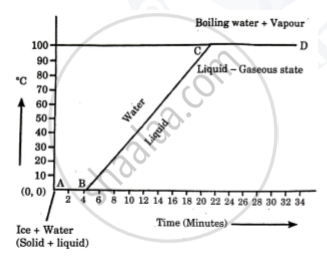Advertisements
Advertisements
प्रश्न
उत्तर
APPEARS IN
संबंधित प्रश्न
State two characteristics of a good thermion emitter.
State any two measures to minimize the impact of global warming.
What is the Greenhouse effect?
What do you understand by the term latent heat?
Explain the following:
The surrounding become pleasantly warm when water in a lake starts freezing in cold countries.
Calculate the total amount of heat energy required to convert 100 g of ice at −10℃ completely into water at 100℃. Specific heat capacity of ice = 2.1 J g-1 K-1, specific heat capacity of water = 4.2 J g-1K-1, specific latent heat of ice = 336 J g-1.
Answer the following:
Explain the role of latent heat in the change of state of a substance.
A thermally insulated pot has 150 g ice at temperature 0°C. How much steam of 100°C has to be mixed to it, so that water of temperature 50°C will be obtained? (Given : latent heat of melting of ice = 80 cal/g, latent heat of vaporization of water = 540 cal/g, specific heat of water = 1 cal/g °C)
Explain the following temperature Vs. time graph:

State two advantages of the high specific latent heat capacity of steam, which is about 226 × 104 J/kg?
State the main precautions to be taken in finding the latent heat of steam.
Calculate the total amount of heat required to convert 100g ice at 0°C to steam at 100°C.
(Specific latent heat of fusion of ice = 336 J/g, specific latent heat of vaporization of steam = 2260 J/g, specific heat capacity of water = 4.2 J/g°C).
Steam at 100°C is passed over 1000 g of ice at 0°C. After some time, 600 g of ice at 0°C is left and 450 g of water at 0°C is formed. Calculate the specific latent heat of vaporization of steam (Given: specific heat capacity of water = 4200 J/kg°C, specific latent heat of fusion of ice = 336,000 J/kg.)
1 kg of water is contained in a 1.25 kW kettle. Assuming specific heat capacity of water = 4.2 J/g °C and specific latent heat of vaporization = 2260 J/g, calculate:
(i) the time taken for the temperature of water to rise from 25°C to its boiling point,
(ii) the mass of water which evaporates per minute from the boiling water.
How fog is formed?
Write scientific reason.
Even if boiling water is constantly heated, its temperature does not rise.
Give some practical applications of specific latent heat of ice.
